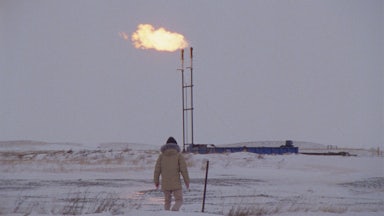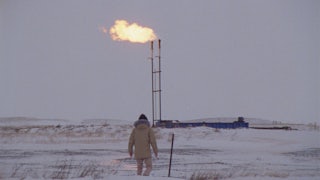As a truck accident spilling 20,000 pounds of East Palestine’s contaminated soil onto a highway made clear this week, the repercussions from Norfolk Southern’s catastrophic train derailment are far from over. But somehow, politicians have yet to learn its lessons.
As a local public radio reporter, I spent much of the last two months trying to make sense of the derailment—how on earth it happened and what it means for the people in the area. The latter question remains unanswered. But the former? That’s easy. No one in American government—not Democrats, not Republicans—protected the people of East Palestine. The black mushroom cloud rising above the tracks was proof, as if we needed it, of our political system’s shortcomings, its inability to check corporate power.
The disaster now frames the lives of people like Tamara and Nelson Freeze, who I met a few weeks after the derailment. The couple live a few hundred feet from where the train left the tracks. Since then, Tamara Freeze has had a sore throat, headaches, problems with balance. She won’t let her niece or nephew come over to their house anymore. She shares a widespread concern held by scientists and residents that officials’ decision to burn the vinyl chloride cargo in a “controlled” manner following the derailment spread dioxins, a group of long-lasting carcinogens that accumulate in the body. The Environmental Protection Agency does not share that concern, noting levels of dioxins it found in soil samples were “similar to typical background levels” and deeming the town park safe enough for the annual Easter Egg Hunt.
The Freezes watched as politicians came and went, all of them talking tough about what would be required of Norfolk Southern, which at the time of the disaster had a market value of around $55 billion. But none told the whole truth about the governmental failures that allowed this derailment to happen. For much of the past 10 years, government has stood by as railroads have earned record profits by cutting work crews, including safety inspectors, and sent bigger and bigger trains out on the rails, all to the dismay of safety experts.
The politicians did try to blame one another. Donald Trump faulted Joe Biden for visiting Ukraine (on a train, no less) rather than East Palestine, using it as a case in point of how places like East Palestine (rural, white, working class) were “forgotten” in America. “In too many cases,” he said, “your goodness and perseverance were met with indifference and betrayal.”
Secretary of Transportation Pete Buttigieg, when he came to town, blamed Trump and Republicans for rolling back a crucial rail safety rule in 2018. “If you’re serious about this, there is more that we could do to prevent more communities from going through this,” he said. The rule mandated superior electronic braking systems on all “high hazard flammable trains.” (When asked about repealing the rule, Trump claimed, somehow, that he “had nothing to do with” it.) Rail safety advocates argue these brakes, had they been on the Norfolk Southern train, may have limited the disaster.
Except this train, despite having 20 cars laden with toxic chemicals, was not considered a “high hazard flammable train.” That’s because when it wrote the rule, the Obama administration sided with railroads, and against its own National Transportation Safety Board, to exclude trains carrying hazardous gases like vinyl chloride from “high hazard” requirements.
None of these details matter much to people like Nelson and Tamara Freeze right now. They’re Trump supporters, though Nelson says he votes for the name, not the party, during elections. The irony of Trump coming to town after dismantling rail safety rules was not lost on Nelson Freeze. But as he sees it, at least Trump came (something Biden still has not done), bringing pallets of food, cleaning supplies, and his own brand of bottled water.
It was tempting for Democrats and progressives to point at Trump’s rail safety rollback as a proximate cause of this disaster. But the truth is much harder and more complicated.
As Nelson Freeze pointed out, Trump’s brake rule rollback didn’t even apply to this train. And couldn’t Biden have reinstated the rule when he got into office, with a Democratic Congress? “If it was so bad and Trump did this, why didn’t he change that back?” Freeze said.
When asked this very question at his press conference, Buttigieg mentioned an obscure cost-benefit requirement that Congress imposed on the brake rule in 2015. That law (signed by Obama) ordered a study to determine if modern brakes would save money for the railroads. If they didn’t, then the rule would be rescinded, as it eventually was under Trump. The cost-benefit requirements, Buttigieg said, “make it very difficult to keep this rule on the books.”
These procedural reasons can start to sound like excuses. In an alternate world, the train crew on the Norfolk Southern train would have noticed problems on one of the cars’ axels earlier, and inspected it. Or the derailment would have happened on a different section of the train, one that contained only frozen vegetables and cases of beer. A lot of things had to go wrong for this to happen, and they did. But the job of government is to foresee these eventualities and do something to protect against them.
From the Freezes’ perspective, the government didn’t care enough to protect them. Their disillusionment has been exacerbated by the EPA’s pronouncements that the air and water in town are safe, even as hundreds have reported feeling sick.
Nelson Freeze knows that big companies, like the railroads, spend millions on campaign donations and even more on lobbying every year. “You got a big company, and they got shareholders, and they support these campaigns, and them campaigns,” Nelson Freeze said. “[And they say] ‘Well, we’re going to take it easy on these regulations, you know, because I want to get this election.…’ Everybody knows that’s how it works.” Another variation of this influence peddling: A top congressional staffer on the committee that oversees railroads recently went to work as a lobbyist for BNSF, a top railroad. As of last year, 75 percent of the lobbyists at Norfolk Southern, specifically, had previously occupied positions in government.
Now members of both parties have introduced new rail safety legislation in Congress. Even Republicans, who have spent decades trying to dismantle the regulatory state, have a few members talking about stronger safety rules. But talk and action are two separate things. And Congress’s track record of standing up to corporate power is not encouraging.
Democrats like to position themselves as on the side of the public in confronting corporate power. But in the case of rail safety, they did little better than the Republicans in this task. And people in East Palestine know it. That’s bad for the Democratic Party, and the country.
While East Palestine’s residents like the Freezes may never be persuaded to vote blue—obviously other issues beside rail safety may factor more heavily—it’s clear Americans might reward candidates who stand up to big business. Voters have a dimmer view of big business than they used to, according to recent Pew polling. A lot of that shift, the polling finds, is coming from rightward-leaning voters who now think just as poorly of banks and large companies as liberals do.
And politics aside, at a practical level Americans need a force willing and able to stand up to large corporations. “The fact is, it happened,” says Nelson Freeze of the train derailment. “And now we’re suffering for that.”










